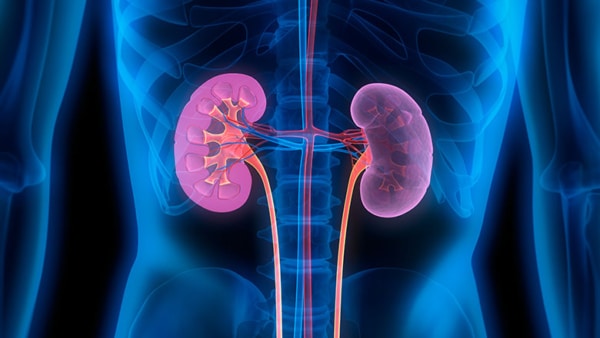How to Boost Kidney Function

Most people take these two fist-sized organs for granted, but kidneys are among the hardest working parts in the body. In one day, your kidneys will filter about 52 gallons of bodily fluids to remove toxins and extra water from the blood. To put that into perspective, that’s about a bathtub of fluid. If your kidneys do not do this filtering work, your body will slowly poison itself.
So, understanding how your kidneys work and figuring out how to boost kidney function are important questions to tackle.
How kidneys work?
The National Institute of Diabetes and Digestive and Kidney Diseases has a great primer on how your kidneys work, complete with diagrams.
The cliff-notes version is this: your kidneys are like the Brita® water filters of the body. Your blood circulates through your kidneys many times a day. Every time, your kidneys filter out the bad things so you can excrete them in your urine and keep the good things, so a healthy balance of water, salts, and minerals is returned to your body to power your nerves, muscles, and tissues.
Why kidney health matters
While your average water filter has to be replaced every two months in order to function effectively, the human kidneys are much more durable and resilient. Most of us can expect to go our entire lives with the same set, but they do weaken over time.
Healthy kidneys filter wastes from the blood at a rate of about 90 milliliters per minute or more, called glomerular filtration rate. As you age, kidney function does start to naturally decline, but you are still considered in the normal range if your GFR is above 60. People are considered kidney failure if they have a GFR of less than 15 for three months or more.
The National Kidney Foundation estimates that 1 in 7 U.S. adults have some level of kidney disease, but 90% don’t know it.
Contributors to kidney disease
A decline in kidney function is normal as people age, but there are several other conditions that can contribute to lower kidney function and thus a higher chance of possible chronic kidney disease.
- Diabetes
- Smoking
- Excessive alcohol use
- High cholesterol
- Uncontrolled high blood pressure
- Some medications
Signs of kidney trouble
If your kidneys aren’t working correctly, waste products and excess fluids can build up in the blood. Unfortunately, most people do not have any symptoms until the more advanced states of kidney disease or complications develop. Some symptoms noted by the National Kidney Foundation that people may experience:
- Foamy urine
- Urinating more often or less often than usual
- Itchy/dry skin
- Feeling tired
- Nausea
- Loss of appetite
- Weight loss
As kidney disease advances, other symptoms include:
- Trouble concentrating
- Numbness or swelling in your arms, legs, ankles, or feet
- Achy muscles or cramping
- Shortness of breath
- Vomiting
- Trouble sleeping
- Breath smells like ammonia
Kidney stones and kidney disease
Kidney stones and kidney disease are not the same thing, but boosting kidney function can help prevent both.
Kidney stones form when minerals excreted from the kidneys crystallize and bind together. Kidney disease is the gradual loss of kidney function over time. But kidney stones left untreated can impair kidney function in a way that could eventually lead to kidney disease. That’s why living a kidney-friendly lifestyle is important.
Living a kidney-healthy lifestyle
Boosting kidney function and living a kidney-healthy lifestyle starts with diet. Check out our blog post on foods that are good for the kidneys and your whole body for a complete list of kidney-friendly foods.
Other tips to boost kidney function:
- Exercise regularly
- Control weight
- Quit smoking
- Drink only in moderation
- Stay hydrated
- Monitor your cholesterol levels
- Lower high blood pressure
- Manage blood sugar levels
- Get an annual physical
If you are concerned about your kidney function, it is important to consult with a doctor. Early detection and treatment can help prevent kidney disease from progressing.
Learn more about the kidney conditions, symptoms, and treatments we offer here. If you want to consult one of our physicians about your kidney health, request an appointment online.

